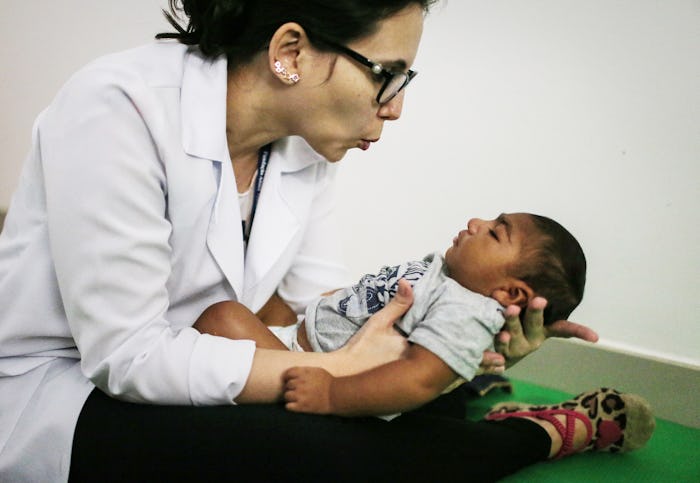Life

How Can Zika Affect Twins? It's Possible Only One Baby Will Develop Birth Defects
The Zika outbreak in Brazil led scientists to a distressing discovery: when a pregnant woman is infected, it's possible her baby may be born with microcephaly. While researchers work to understand exactly why there's a link between Zika and microcephaly, authorities still advise pregnant women in areas with Zika to take any precautions necessary to avoid the virus. The results of fetal infection can be unpredictable: some pregnant women with Zika ultimately give birth to healthy babies, but there's currently no way to consistently predict the outcome. Now, medical professionals hope to understand the phenomenon better by studying twins. How can Zika affect twins? It's possible for one baby to develop birth defects while the other doesn't, and the reason why could greatly influence doctors' approaches to protecting fetuses.
Mom Jaqueline Jessica Silva de Oliveira gave birth to twins in Brazil after being infected with Zika; according to Reuters, daughter Laura has microcephaly while son Lucas does not. Sao Paulo researchers are studying five sets of twins, including Oliveira's, to determine what makes a fetus particularly vulnerable to Zika. Scientists don't expect immediate answers about why one twin may get microcephaly while the other doesn't, The Cut reported; it may take about a year to reach a definitive conclusion.
For now, researchers mainly advance one of three hypotheses, according to Reuters. One fetus' neurons may be particularly resistant to the impact of infection. There may be a genetic predisposition that invites Zika to make the alterations needed to cause microcephaly. There's also a possibility that it has more to do with the make-up of the placenta: both fraternal and identical twins can have individual placentas in the womb, The Cut reported, and one may be more vulnerable than the other.
It's unclear exactly how many Zika-infected pregnant women have babies with microcephaly; according to PBS NewsHour, two studies delivered estimates. Scientists who studied the outbreak in French Polynesia (stretching from 2013 to 2015) found that about one percent of babies born to mothers who had a Zika infection developed microcephaly. In Brazil, scientists found that, within the group of mothers they studied, only about five percent had babies with microcephaly linked to Zika (though 29 percent of babies appeared to have some Zika-related birth defect). Until scientists can determine why fetuses face particularly significant health challenges following a Zika infection, the medical community still advises pregnant women to protect themselves from mosquito bites and other methods of transmission as best they can.
By working with researchers, Oliveira and other moms in a similar situation may be able to help doctors prevent babies from enduring the pain of Zika-related microcephaly in the future; "The doctors want to study them so they can see what protected Lucas in case it can help other children," Oliveira told Reuters. If scientists are successful, they may be able to prevent the development of microcephaly in fetuses and ensure pregnant women have much less to fear following a Zika infection.